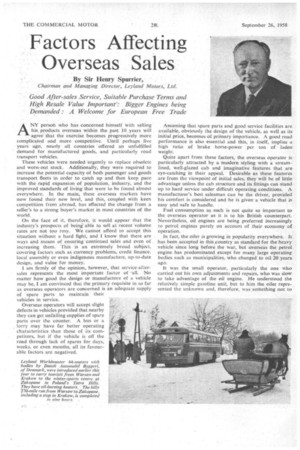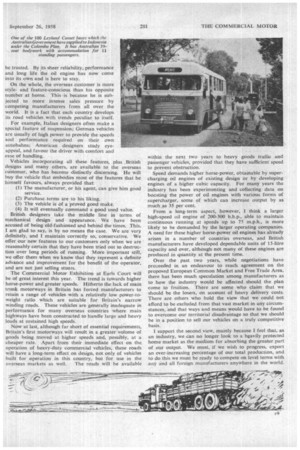Factors Affecting Overseas Sales
Page 122

Page 123

If you've noticed an error in this article please click here to report it so we can fix it.
By Sir Henry Spurrier,
• Chairman and Managing Director, Leyland Motors, Ltd.
Good After-sales Service, Suitable Purchase Terms and High Resale Value Important': Bigger Engines being • Demanded : A Welcome for European Free Trade
ANY person who has concerned himself with selling . his products overseas within the past 10 years will agree that the exercise becomes progressively more complicated and more competitive. Until perhaps five years' ago, nearly all countries offered an unfulfilled
demand for manufactured goods, and particularly road transport vehicles.
These vehicles were needed urgently to replace obsolete and worn-out stock. Additionally, they were required to increase the potential capacity of both passenger and goods transport fleets in order to catch up and then keep pace with the rapid expansion of population, industry, and the improved standards of living that were to be found almost everywhere. In the main, these overseas markets have now found their new level, and this, coupled with keen competition from abroad, has effected the change from a seller's to a strong buyer's market in most countries of the world.
On the face of it, therefore, it would appear that the industry's prospects of beini able to sell at recent volume rates are not too rosy. We cannot afford to accept this situation without a hard fight, and I know that there are ways and means of ensuring continued sales and even of increasing them. This is an extremely broad subject, covering factors such as currency problem's, credit finance, local assembly or even indigenous manufacture, up-to-date
design, and value for money.
I am firmly of the opinion, however, that service-after sales represents the most important factor 'of -all. No matter how good the design or manufacture of a vehicle inay be, I am convinced that the primary requisite in so far as overseas operators are concerned is an adequate supply
of spare parts to maintain. their vehicles in service.
Overseas operators will accept slight defects in vehicles provided that nearby they can get unfailing supplies of spare
partsover the counter. A bus or a lorry may have far better operating
characteristics than those of its competitors, but if the vehicle is off the road through lack of spares for days, weeks, or even months, all its favourable factors are negatived. Assuming that spare parts and good service facilities are available, obviously the design of the vehicle, as well as its initial price, becomes of primary importance. A good road performance is also essential and this, in itself, implies a high ratio of brake, horse-power per ton of laden weight.
Quite apart from these factors, the overseas operator is particularly attracted by a 'modern styling with a streamlined, well-glazed cab and imaginative features that are eye-catching in their appeal. Desirable as these features are from the viewpoint of initial sales, they will be of little advantage unless the cab structure and its fittings can stand up to hard service under difficult operating conditions. A manufacturer's best salesman can he the driver, provided his comfort is considered and -he is given a vehicle that is easy and safe to handle.
Fuel consumption as such is not quite so important to the overseas operator as it is to his British counterpart. Nevertheless, oil engines are being preferred increasingly to petrol engines purely on account of their economy of operation.
In fact, the oiler is growing in popularity everywhere. It has been accepted in this Country as standard for the heavy vehicle since long before the war, but overseas the petrol engine has predominated except for many large operating bodies such as municipalities, who changed to oil 20 years ago: It was the small operator, particularly the one who carried out his own adjustments and repairs, who was slow to take advantage of the oil engine. He understood the relatively simple gasoline unit, but to him the oiler represented the unknown and, therefore, was something not to be trusted. By its sheer reliability, performance and long life the oil engine has now come into its own and is here to stay.
On the whole, the overseas customer is more styleand feature-conscious than his opposite number at home. This is because he is subjected to more intense sales pressure by competing manufacturers from all over the world. It is a fact that each country develops its road vehicles with trends peculiar to itself.
For example, Italian designers often make a special feature of suspension; German vehicles are usually of high power to provide the speeds and performance required on their own autobahns; American designers study eye appeal, and favour the driver with comfort and ease of handling. • Vehicles incorporating all these features, plus British designs and many others, are available to the overseas customer, who has become distinctly discerning. He will buy the vehicle that embodies most of the features that he himself favours, always provided that: (1) The manufacturer, or his agent, can give him good service.
(2) Purchase. terms are to his liking.
(3) The vehicle is of a proved good make.
(4) It will eventually command a good used value.
British designers take the middle line in terms of mechanical design and appearance. We have been accused of being old-fashioned and behind the times. This, I am glad to say, is by no means the case. We are very definitely, and I maintain correctly so, conservative. We offer our new features to our customers only when we are reasonably certain that they have been tried out to destruction over long periods of running. More important still, we offer them when we know that they represent a definite advance and improvement for the benefit of the operator, and are not just selling stunts.
The Commercial Motor Exhibition at Earls Court will be of great interest this year. The trend is towards higher horse-power and greater speeds. Hitherto the lack of main trunk motorways in Britain has forced manufacturers to retain a range of vehicles with a relatively low power-toweight ratio which are suitable for Britain's narrow winding roads. These vehicles are generally inadequate in performance for many overseas countries where main highways have been constructed to handle large and heavy loads at sustained high speeds.
Now at last, although far short of essential requirements, Britain's first motorways will result in a greater volume of goods being moved at higher speeds and, "possibly, at a cheaper rate. Apart from their immediate effect on the operation of heavy-duty commercial vehicles, these roads will have a long-term effect on design, not only of vehicles built for operation in this country, but for use in the overseas markets as well. The roads will be available within the n.ext two years to heavy goods traffic and passenger vehicles, provided that they have sufficient speed to prevent obstruction.
Speed demands higher horse-power, obtainable by supercharging oil engines of existing design or by developing engines of a higher cubic capacity. For many years the industry has been experimenting and collecting data on boosting the 'power of oil engines with various forms of supercharger, some of which can increase output by as much as 35 per cent.
From a long-term aspect, however, I think a larger high-speed oil engine of 2007300 b.h..p., able to maintain continuous running at speeds up to 75 m.p.h., is more likely to be demanded by the larger operating companies. A need for these higher horse-power oil engines has already arisen in a number of countries overseas, and British manufacturers have developed dependable units of 15-litre capacity and over, although not many of these engines are produced in quantity at the present time. .
Over the past two years, while negotiations have proceeded in an endeavour to reach agreement on the proposed European Common Market and Free Trade Area, there has been much speculation .among manufacturers as to how the industry would be affected should the plan come to fruition. There are some who claim that we should be the losers, on account of heavy delivery costs. There are others who hold the view that we could not afford to be excluded from that vast market in any circumstances, and that ways and means would have to be found to overcome our territorial disadvantage so that we should be in a position to sell our vehicles on a truly competitive basis.
I support th.e second view, mainly because I feel that, as an industry, we can no longer look to a heavily protectedhome market as the medium for absorbing the greater part of our output. We must, if we wish to progress, export an ever-increasing percentage of our total production, and to do this we must be ready to compete on level terms with any and all foreign manufacturers anywhere in the world.












































































































































































































































































































































